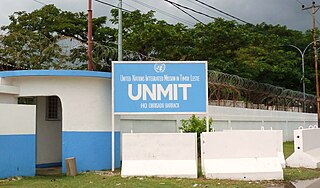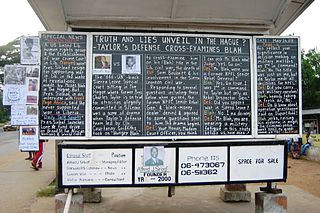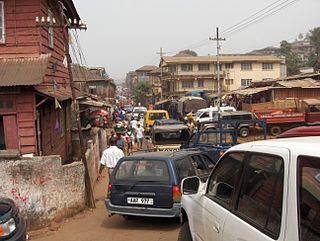
The United Nations Mission in Sierra Leone (UNAMSIL) was a United Nations peacekeeping operation in Sierra Leone from 1999 to 2006. It was created by the United Nations Security Council in October 1999 to help with the implementation of the Lomé Peace Accord, an agreement intended to end the Sierra Leonean civil war. UNAMSIL expanded in size several times in 2000 and 2001. It concluded its mandate at the end of 2005, the Security Council having declared that its mission was complete.

The United Nations Peacebuilding Commission (PBC) is a United Nations intergovernmental advisory body of both the General Assembly and the Security Council that supports peace efforts in conflict-affected countries. A key addition to the capacity of the international community in the broad peace agenda, it was established in 2005 with the passage of both A/RES/60/180 and S/RES/1645 Mr. Sérgio França Danese (Brazil) is the incumbent chair of the PBC.

United Nations Security Council resolution 1346, adopted unanimously on 30 March 2001, after recalling previous resolutions on the situation in Sierra Leone, the Council extended the mandate of the United Nations Mission in Sierra Leone (UNAMSIL) for a further six months and increased the size of its military component.

United Nations Security Council resolution 1370, adopted unanimously on 18 September 2001, after recalling resolutions 1270 (1999), 1289 (2000), 1313 (2000), 1317 (2000), 1321 (2000) and 1346 (2001) on the situation in Sierra Leone, the Council extended the mandate of the United Nations Mission in Sierra Leone (UNAMSIL) for a period of six months until 31 March 2002, beginning from 30 September 2001.

United Nations Security Council resolution 1385, adopted unanimously on 19 December 2001, after recalling all resolutions on the situation in Sierra Leone, particularly resolutions 1132 (1997), 1171 (1998), 1299 (2000) and 1306 (2000), the Council extended sanctions against the import of rough diamonds except those controlled by the government from the country for a further 11 months, beginning on 5 January 2002.

United Nations Security Council resolution 1537, adopted unanimously on 30 March 2004, after recalling all previous resolutions on the situation in Sierra Leone, the council extended the mandate of the United Nations Mission in Sierra Leone (UNAMSIL) for six months until 30 September 2004 with a residual force remaining in the country until June 2005.

United Nations Security Council Resolution 1940, adopted unanimously on September 29, 2010, after recalling all previous resolutions on the situation in Sierra Leone, including resolutions 1132 (1997) and the 1171 (1998), the Council lifted an arms embargo and remaining sanctions against the country imposed in 1997.

United Nations Security Council Resolution 1941, adopted unanimously on September 29, 2010, after recalling all previous resolutions on the situation in Sierra Leone, particularly Resolution 1886 (2009), the Council extended the mandate of the United Nations Integrated Peacebuilding Office in Sierra Leone (UNIPSIL) until September 15, 2011.

United Nations Security Council Resolution 1949, adopted unanimously on 23 November 2010, after recalling previous resolutions on the situation in Guinea-Bissau, particularly Resolution 1876 (2009), the Council extended the mandate of the United Nations Integrated Peacebuilding Office in Guinea-Bissau (UNIOGBIS) for a further period of one year until 31 December 2011.

United Nations Security Council Resolution 1969 was adopted unanimously on February 24, 2011; after reaffirming resolutions 1599 (2005), 1677 (2006), 1690 (2006), 1703 (2006), 1704 (2006), 1745 (2007), 1802 (2008), 1867 (2009) and 1912 (2010) on the situation in East Timor (Timor-Leste), the Council decided to extend the mandate of the United Nations Integrated Mission in Timor-Leste (UNMIT) for a year, until February 26, 2012.

United Nations Security Council Resolution 1971, adopted unanimously on March 3, 2011, after recalling previous resolutions on the situation in Liberia and Sierra Leone, including Resolution 1626 (2005), the Council requested the United Nations Mission in Liberia (UNMIL) to withdraw its military personnel providing security for the Special Court for Sierra Leone, and placed the responsibility for security with the Sierra Leone Police.

United Nations Security Council resolution 1620, adopted unanimously on 31 August 2005, after recalling all previous resolutions on the situation in Sierra Leone, the council established the United Nations Integrated Office in Sierra Leone (UNIOSIL) for an initial period of twelve months beginning on 1 January 2006, to replace the United Nations Mission in Sierra Leone (UNAMSIL).

United Nations Security Council resolution 1626, adopted unanimously on 19 September 2005, after recalling all previous resolutions on the situations in Liberia and Sierra Leone, particularly resolutions 1509 (2003), 1610 (2005) and 1620 (2005), the Council extended the mandate of the United Nations Mission in Liberia (UNMIL) until 31 March 2006 and authorised the deployment of 250 troops to Sierra Leone to protect the Special Court.

United Nations Security Council resolution 1638, adopted unanimously on 11 November 2005, after recalling all previous resolutions on the situation in Liberia, Sierra Leone and West Africa, the Council included the apprehension, detention and transfer to the Special Court for Sierra Leone of former Liberian President Charles Taylor in the mandate of the United Nations Mission in Liberia (UNMIL).

United Nations Security Council Resolution 1734, adopted unanimously on December 22, 2006, after recalling all previous resolutions on the situation in Sierra Leone, including resolutions 1620 (2005) and 1688 (2006), the Council renewed the mandate of the United Nations Integrated Office in Sierra Leone (UNIOSIL) until December 31, 2007.
United Nations Security Council Resolution 1793 was unanimously adopted on 21 December 2007.
United Nations Security Council Resolution 1886 was unanimously adopted on 15 September 2009.
United Nations Security Council Resolution 1885 was unanimously adopted on 15 September 2009.
United Nations Security Council Resolution 1829 was unanimously adopted on 4 August 2008.

United Nations Security Council Resolution 2065 was unanimously adopted on 12 September 2012.












